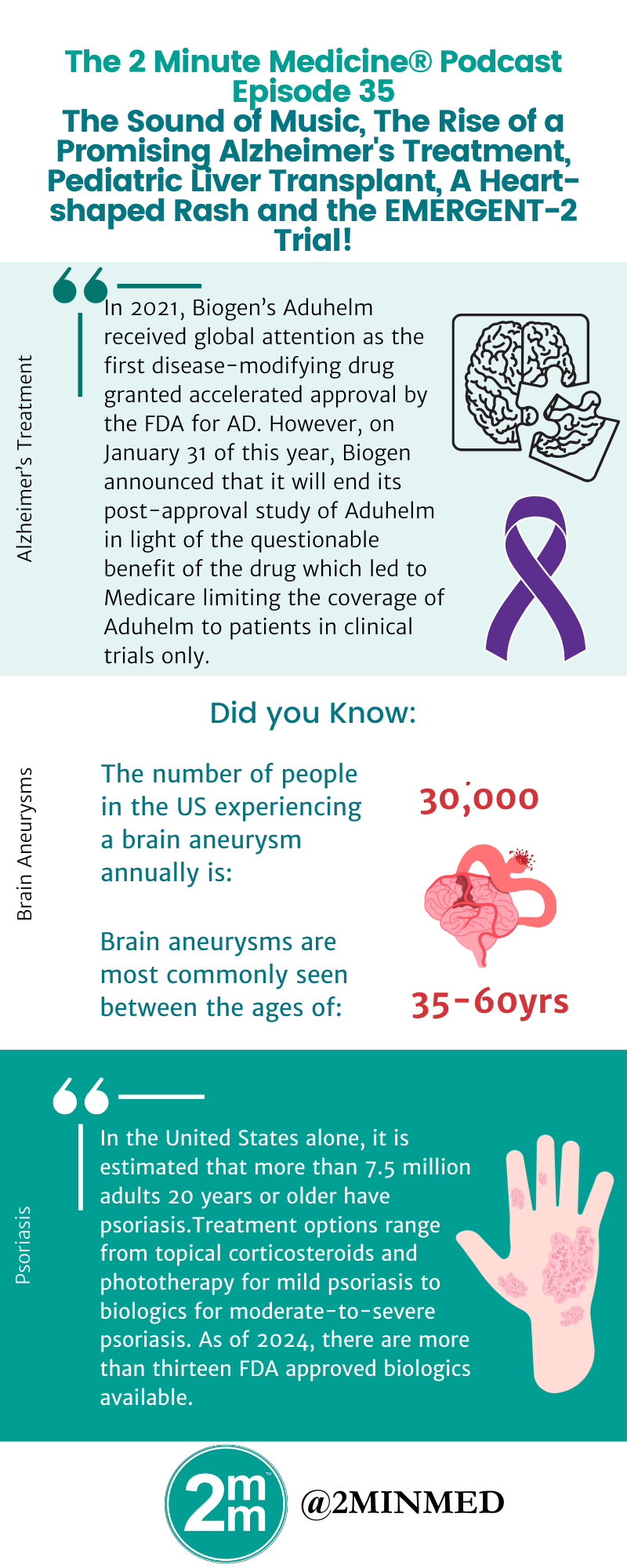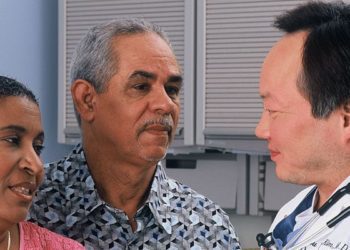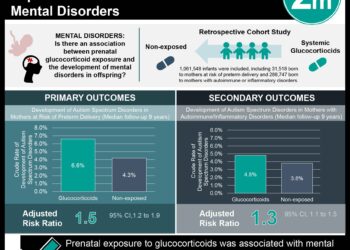The 2 Minute Medicine Podcast Episode 35
February 22nd 2024
Welcome to the 2 Minute Medicine Podcast, summarizing the latest medical studies, curated and written by practicing physicians. On this podcast, twice a month, we cover the latest in healthcare news and research evidence.
Our episode is live!
Episode Description
We begin with a discussion about our article of the week which comes from The Lancet and is entitled “Efficacy and safety of the muscarinic receptor agonist KarXT (xanomeline–trospium) in schizophrenia (EMERGENT-2) in the USA: results from a randomised, double-blind, placebo-controlled, flexible-dose phase 3 trial.” Then we discuss the challenges and recovery after having brain aneurysm and talk about the first disease modifying FDA approved drug for Alzheimer’s disease. After that, we take a look at liver transplant in children. Finally, we go over psoriasis and briefly go over risk factors and treatments.
Click here to listen to this episode on Apple podcast
Click here to listen to this episode on Spotify
Transcript
[Deepti]: Welcome to the 2 Minute Medicine Podcast, summarizing the latest medical studies, curated and written by practicing physicians.
For our full suite of daily medical study summaries and updates written by practicing doctors, please visit our website at 2minutemedicine.com to start reading new daily content right now, for free. On this podcast, twice a month, we cover the latest in health care news and research evidence. We are your hosts Deepti and Andrew. On today’s episode, we’ll start by discussing our two articles of the week. In the second half of the episode, we will look at health issues that have arisen in popular media.
[Andrew]: Our article of the week comes from The Lancet and is entitled “Efficacy and safety of the muscarinic receptor agonist KarXT (xanomeline–trospium) in schizophrenia (EMERGENT-2) in the USA: results from a randomised, double-blind, placebo-controlled, flexible-dose phase 3 trial.”
Current antipsychotic therapies for schizophrenia are associated with adverse side effects and medication resistance, often due to antagonism of the D₂ dopamine receptors. As such, new treatments are needed. Xanomeline, a dual M₁ and M₄ muscarinic receptor agonist, in combination with trospium (KarXT), presents a unique approach without blocking D₂ dopamine receptors.
Between Dec 16, 2020, and Apr 13, 2022, 407 patients were screened for eligibility across 22 inpatient sites in the USA. Included were patients aged 18–65 with schizophrenia, an episode of acute psychosis requiring hospitalization, a PANSS score ≥ 80, and Clinical Global Impression-Severity score ≥ 4. Altogether, 252 patients (126 in KarXT and placebo, respectively) were included in the final analysis. The primary outcome of a reduction in PANSS score was significantly greater in the KarXT group (-21.2 points, standard error [SE] 1.7) than in the placebo group (-11.6 points, SE 1.6; p<0.0001). This was also the case for secondary outcomes of PANSS positive-subscale score (-2.9 points, p<0.05) and PANSS negative-subscale score (-1.8 points, p<0.05) in KarXT. Findings from this study suggest that KarXT is effective in reducing positive and negative symptoms of schizophrenia, offering a new class of well-tolerated antipsychotic medications. The study was limited by a relatively short trial duration, thus affecting the validity of the findings.
[Andrew] Now for The Scan.
The story: The 2024 Grammys was not short of pleasant surprises: Miley Cyrus won her first-ever Grammy for her hit song “Flowers”. Celine Dion presented Taylor Swift’s award amid her stiff person syndrome diagnosis and at the age of 84, Joni Mitchell, the Canadian-American singer and songwriter also had her first performance at Grammys. However, what made this first-time performance even more outstanding is that Joni had a brain aneurysm in 2015 which took away her ability to talk and walk for a while. So, what is life like after a brain aneurysm?
[Deepti] To answer this, first, let’s look at what a brain aneurysm is. Brain or cerebral aneurysms happen when there is a ballooning from a thin spot on a brain artery that fills with blood putting pressure on the surrounding brain nerves and tissue. If this artery wall thins out too much, it may rupture and cause bleeding. The length of recovery post ruptured aneurysms is significantly impacted by the extent of bleeding and the physical limitations might be short or long term. Brain aneurysm survivors may experience a variety of cognitive deficits such as memory and speech difficulties as well as vision impairments. Additionally, survivors may experience motor skill deficits such as loss of balance and arm or leg weakness. Joni for example, lost her ability to speak and walk after her brain aneurysm and had to relearn speaking, singing, and playing the guitar. The singer still has mobility issues as evident in her slow walk with a cane on the stage. However, rehabilitation therapy, practice and watching videos of her previous performances helped the singer to regain much of her lost abilities as we saw in her performance of “Both Sides Now” song.
In the United States, about 30,000 people experience brain aneurysm rupture annually. Brain aneurysms are more common among people aged 35-60 years old. Emilia Clarke, the 37-year-old Game of Thrones actress, survived two brain aneurysms in 2011 and 2013. Considering herself lucky to not suffer from long-lasting cognitive and physical impairments, she believes more awareness is needed about the recovery process after brain aneurysm as many affected individuals do not have the resources to get back to a fulfilling life. She launched a brain injury recovery charity called SameYou to advocate for brain injury survivors. Since 2023, SameYou has become a founding member of the WHO’s World Rehabilitation Alliance to promote rehabilitation as an essential health service. Next, let’s take a look at the rise of a promising Alzheimer’s treatment.
[Andrew] From the New York Time Best Seller “Still Alice” to the Disney + series “Limitless”, dementia has been a common subject in novels and movies. In a captivating performance by Anthony Hopkins in “The Father”, we experience the progressive disorientation and confusion induced by dementia from the perspective of the affected individual. In 2020, when “The Father” was released, it was estimated that over 55 million people live with dementia worldwide. It is estimated that by 2030, the number will go up to 78 million. Alzheimer’s disease (AD) is the most common type of dementia and responsible for 50-70% of dementia cases. Yet, current treatments available offer limited efficacy as they do not delay or prevent the disease progression.
In 2021, Biogen’s Aduhelm received global attention as the first disease-modifying drug granted accelerated approval by the FDA for AD. However, on January 31 of this year, Biogen announced that it will end its post-approval study of Aduhelm in light of the questionable benefit of the drug which led to Medicare limiting the coverage of Aduhelm to patients in clinical trials only.
Having forgone Aduhelm, Biogen has directed more of its resources towards another promising treatment. Biogen and Eisai co-commercialize Leqembi (Lecanemab) which is an infusion therapy indicated for the early stages of the disease, and it is the first drug that has been shown to slow the progression of mild AD. Considering the importance of early intervention in preserving brain health, Leqembi may serve as a milestone in AD Treatment. Next, let’s discuss pediatric liver transplants.
[Deepti] Ordinary Angels”, a 2024 movie coming out in February, is inspired by a true story of a father with a critically ill daughter waiting for a liver transplant. The daughter suffers from “biliary atresia”, the leading reason for liver transplantation in children. Biliary atresia is a rare disease and in Canada, the incidence is 1 in 19000 live births. The incidence is higher among female, premature, Asian, and black infants. The first treatment for biliary atresia is a surgery called “Kasai Procedure.” This surgery is usually done before the baby is 10 weeks old and it delays the need for liver transplantation in children.
In contrast to children, the most common reason behind liver transplant in adults is cirrhosis, caused by different conditions including but not limited to hepatitis B and C and genetic diseases affecting the liver. A well-known example is David Crosby, an American musician who had hepatitis C and was a liver transplant recipient in 1994.
Last but not least, on January 30, Kim Kardashian revealed to her Instagram followers a heart-shaped scaly rash on her leg. Another painful flare-up of psoriasis, a chronic inflammatory skin disorder. Let’s take a closer look at this next.
[Andrew] There are several types of psoriasis with “plaque psoriasis” being the most common type. Plaque psoriasis flares are usually manifested as red, itchy, and scaly skin patches appearing on various body parts. The flares typically last between weeks and months, meaning that the 43-year-old media personality will most likely maintain her heart-shaped flare-up for Valentine’s day.
[Deepti] That’s right. In the United States alone, it is estimated that more than 7.5 million adults 20 years or older have psoriasis.
Treatment options range from topical corticosteroids and phototherapy for mild psoriasis to biologics for moderate-to-severe psoriasis. As of 2024, there are more than thirteen FDA approved biologics available. In our previous articles, some of the current biologics have been compared and discussed.
[Andrew] Despite not being a new biologic, adalimumab will have an important role in changing the 2024 psoriasis treatment landscape because now there are nine FDA approved adalimumab biosimilars making access to this drug easier and more cost-effective.
We’d like to acknowledge the following members of our team for their contributions to this week’s episode
- Marzyeh Azimi
- Neel Mistry
- Teddy Guo
Thank you for joining us today for this episode of the 2 Minute Medicine Podcast. New episodes come out every other week and all of our content has been curated and written by practicing physicians.
Please head to our website at 2minutemedicine.com to learn more and to access all of our content including medical study summaries, visual abstracts, excerpts from our Classics book series which is available on Amazon, and The Scan, which is our medical newsletter.
Thank you so much once again. To make sure that you don’t miss any of our content please subscribe and follow us on Twitter or Instagram @2MinMed
©2024 2 Minute Medicine, Inc. All rights reserved. No works may be reproduced without expressed written consent from 2 Minute Medicine, Inc. Inquire about licensing here. No article should be construed as medical advice and is not intended as such by the authors or by 2 Minute Medicine, Inc.









